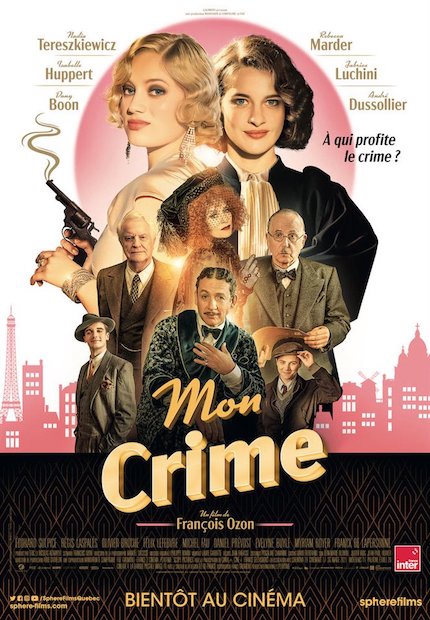THE CRIME IS MINE (Mon Crime) Review: Liberty, Equality and Sisterhood

Two roommates, Pauline (Rebecca Marder) and Madeleine (Nadia Tereszkiewicz) are having an unpleasant but, sadly, not at all uncommon female experience.
While Pauline is trying to convince their landlord to once again postpone the paying of the rent which they do not have, Madeleine is fleeing the home of a notorious producer who invited her under the pretense of offering her a role in a play and then consequentially attempted to sexually harass her.
Upon learning that her boyfriend considers prostituting himself to a wealthy heiress and making Madeleine his mistress, the latter briefly considers suicide, but opts for going to the movies with Pauline instead. The ladies’ luck changes abruptly when the creepy producer’s body is discovered, and Madeleine is singled out as the most logical culprit.
Madeleine and her lawyer friend don’t really mind. They cook up a plan for Madeleine to confess to murder, give a performance of a lifetime in court and for the two of them finally become famous.
As is obvious from the briefest of synopsis, with The Crime is Mine (Mon Crime, originally) François Ozon returns to comedy, following his 8 Women (2002) and Potiche (2010). The newest installment clearly takes after its predecessors, combining wonderfully camp aesthetics, absurdist humor and keeping the focus on female protagonists in a generally hostile society.
On the surface, The Crime is Mine looks decidedly old-fashioned with its theatrical roots (the film is based on a 1934 play by Georges Berr and Louis Verneuil), dusty colors, actual iris shots and the postcard looking Paris of the 1930s which borders on cartoonish, but its meaning and agenda are positively modern.
This farce is aimed at social institutions and expectations as a whole, taking very specific bites at the concept of justice, the essence of fame and, even more so at miserable societal roles commonly appointed for women in a men’s world. Here, murder becomes one of few available ways for women to retrieve their agency, so much so, that the crime itself becomes a point of competition between multiple women.
At this point in the story, the great Isabelle Huppert enters the scene as a forgotten star of the silent movie era, upping the ante by way of trying to confess to being the real murderer and demanding something for her troubles: fame, money or at least some wienerwursts for lunch. Some bits of humor are perhaps too bittersweet to actually be easily laughed at, but it doesn’t take away from the film’s poignancy or its potential as a crowd-pleaser.
Both Tereszkiewicz and Marder are fantastic, and the supporting cast of titans such as Dany Boon, Fabrice Luchini and André Dussollier is ever reliable. But it is Huppert who predictably chews the scenery, and her scenes – the wienerwursts! negotiating with the investigating judge for a suitable crime to confess to! – are among the funniest ones.
Then, there are small tidbits that support the authors’ point without being too on the nose, such as the casual mention of Alice Guy-Blaché, an actual female pioneer of cinema who was notably excluded from the historical film record for many years. Like in all of Ozon’s best films, there is simply a certain kind of magic here.
In the midst of all the absurdity and delightful madness, The Crime is Mine remains convincing as a feminist fantasy, its only truly unbelievable part being the idea that Isabelle Huppert can somehow be forgotten by anyone.







